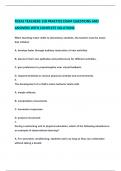-
1. Exam (elaborations) - Trec-texas home inspector test: electrical questions with complete verified solution
-
2. Exam (elaborations) - Texas life insurance exam exam questions with correct answers graded a+, latest updat...
-
3. Exam (elaborations) - texas esthetics state board review questions with correct answers updated
-
4. Exam (elaborations) - esthetics state board exam texas questions with correct answers
-
5. Exam (elaborations) - Esthetics state board exam texas exam questions with complete solutions
-
6. Exam (elaborations) - Texas esthetics state board: milady and salon fundamentals questions with complete so...
-
7. Exam (elaborations) - Texas cosmetology state board questions with complete answers
-
8. Exam (elaborations) - aveda esthetics texas state board prep questions with complete solutions
-
9. Exam (elaborations) - Texas adjuster exam questions and answers updated
-
10. Exam (elaborations) - State of texas security level ii certification exam questions with complete verified ...
-
11. Exam (elaborations) - Texas barber exam practice test latest 2024 graded a+
-
12. Exam (elaborations) - Texas barber exam 2024 questions with complete solutions
-
13. Exam (elaborations) - Texas barber college exam questions and verified correct answers
-
14. Exam (elaborations) - Texas barber written exam prep questions with complete verified answers graded a+
-
15. Exam (elaborations) - Texas life insurance exam 2024 questions with complete solutions verified
-
16. Exam (elaborations) - Texas cosmetology written exam 2024 questions and verified correct answers 100% guara...
-
17. Exam (elaborations) - Texas history spring 2024 final exam questions and correct verified answers
-
18. Exam (elaborations) - Texas lead inspector / lead risk assessor combo prep for course exam 2024 questions a...
-
19. Exam (elaborations) - Texas tsa statesman degree exam - 2024 questions with complete verified answers
-
20. Exam (elaborations) - Texas history semester exam 2023-2024 questions and correct verified answers graded a...
-
21. Exam (elaborations) - Cosmetology texas state board written exam 2023-2024 questions with complete solution...
-
22. Exam (elaborations) - Texas bon study guide, bon quiz, jurisprudence exam questions with complete solutions
-
23. Exam (elaborations) - Nursing jurisprudence and ethics for texas nurses exam questions and verified answers...
-
24. Exam (elaborations) - Texas nursing jurisprudence exam questions with complete correct answers
-
25. Exam (elaborations) - Texas state inspector safety cert. exam questions with complete solutions verified 20...
-
26. Exam (elaborations) - Tcole practice exam: texas basic peace officer exam questions with complete solutions...
-
27. Exam (elaborations) - Texas basic peace officer certification practice exam questions with complete solutio...
-
28. Exam (elaborations) - Texas teachers assessment 6 exam questions with complete solutions 100% verified grad...
-
29. Exam (elaborations) - Texas teachers assessment 6 exam questions with complete solutions verified graded a+
-
30. Exam (elaborations) - Texas teachers assessment 6 100 questions and answers with complete 100% verified sol...
-
31. Exam (elaborations) - Texas teachers assessment 6 actual exam questions 100% solved with verified correct s...
-
32. Exam (elaborations) - texas teachers assessment 1 exam questions with complete solutions answered 100% gua...
-
33. Exam (elaborations) - Texas teachers assessment 1 exam questions with complete solutions verified graded a+
-
34. Exam (elaborations) - Texas teachers assessment 1 exam questions with complete solutions verified graded a+
-
35. Exam (elaborations) - Texas teachers assessment 2 exam questions and answers with complete verified solutio...
-
36. Exam (elaborations) - Texas teachers assessment 2 exam questions with complete solutions verified already p...
-
37. Exam (elaborations) - Texas teachers assessment 2 exam questions with complete solutions verified latest up...
-
38. Exam (elaborations) - texas teachers assessment 2 exam questions and verified answers
-
39. Exam (elaborations) - Texas teachers assessment 3 exam questions with complete solutions verified graded a+
-
40. Exam (elaborations) - Texas teachers assessment 3 exam questions with complete solutions verified graded a+
-
41. Exam (elaborations) - Texas teachers assessment 3 700.3a exam questions with complete verified answers grad...
-
42. Exam (elaborations) - Texas teachers assessment 4 exam questions with complete solutions verified graded a+
-
43. Exam (elaborations) - Texas teacher assessment 4 exam questions and answers with complete verified solution...
-
44. Exam (elaborations) - Texas teachers assessment 4 - elementary 700.4ae actual exam questions with complete ...
-
45. Exam (elaborations) - Texas teachers assessment 5 exam questions with complete solutions verified graded a+
-
46. Exam (elaborations) - Texas teachers 158 practice exam questions and answers with complete solutions
-
47. Exam (elaborations) - Texas teachers questions and answers with complete solutions verified graded a+
-
Show more




